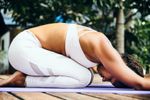As a single 30-something living in New York City, I spend my fair share of time at bars, restaurants or apartment get-togethers — all of which typically include sipping at least a few a cocktails or glasses of wine.
Lately, though, I’ve experienced more than the predictable next-day headache and nausea — I’ve had pangs of anxiety, worry and even panic that linger for a day or two. It’s not about regret from the night before, but rather a vague, can’t-put-my-finger-on-it sense of unease.
I’m no stranger to anxiety, and I know I’m not alone in experiencing this strange sense of dread the day after drinking — according to my friends and the Internet. In one survey, about 23 percent of people say they’ve experienced "hangxiety," aka the negative mental and emotional effects of a hangover. More proof: #hangxiety has more than 27 million views on TikTok and 62,000 search results on Google.
To find out what’s really happening in our brains as (and after) we drink, I sought the advice of Uma Naidoo, MD, a nutritional psychiatrist and author of This Is Your Brain on Food, and Carolyn Brown, MS RD, nutritionist and co-founder of Indigo Wellness Group.
Turns out that while it may sound like a made-up term, hangxiety is a real bio-chemical reaction to alcohol. Luckily, there are ways to minimize its effects.
How Alcohol Affects Your Brain and Body
Many of us have felt the urge to reach for a beer or glass of wine to take the edge off after a stressful day — and for good reason: There is some truth to the idea that alcohol can help you relax, says Naidoo. “Alcohol acts as a depressant of the central nervous system — it works by slowing our brain activity down,” she explains, which is why some find it helpful to soothe anxiety or aid in falling asleep. (Note that you should never use alcohol as medication. This can lead to substance use disorders and long-term health consequences.)
But “calm” is not the only effect alcohol has on our body and mind. “When we drink, we change the effects of many neurotransmitters in the brain,” explains Naidoo. Dopamine pathways (the feel-good neurotransmitter) fire more, which may explain that good mood when you’re out having a drink, while the activity of GABA (an inhibitory neurotransmitter) is also heightened, which helps you feel relaxed.
At the same time, our brain’s stimulatory system is suppressed (cue slurred speech and stumbling steps), and other neurotransmitters, such as mood-boosting serotonin, are thrown out of balance.
Alcohol can also wreak havoc on your blood sugar balance, says Brown — much in the same way that eating simple carbs or refined sugars can lead to a spike followed by a subsequent dip in both your energy and your mood. Alcohol works the same way by creating a heightened sense of calm or relaxation followed by a heightened sense of stress and anxiety in the aftermath.
You might already know that the gut-brain connection plays a major role in our overall well-being, especially our mental health. It shouldn’t come as a surprise that alcohol has a detrimental effect on our gut health — which can cause a myriad of other issues.
Brown points to one study that found that even one episode of heavy drinking can damage the mucosal cells in your stomach — aka your gut lining — which can increase gut permeability and cause issues like leaky gut and inflammation.
RELATED: 6 Ways an Out-of-Balance Gut Affects Your Well-Being
What Causes Sunday Scaries
As the mood-heightening effects of alcohol wear off and the neurotransmitters in our brain return to their normal levels (or lower), whatever anxiety or stress we were trying to cover up rears its ugly head again. “This means you may experience feelings of depression, anxiety or even full-blown panic the days after a drinking episode,” notes Naidoo.
The day or two after, you are also likely to be dehydrated, which extensive research has linked to anxiety. For a double whammy, alcohol use can also increase the heart rate the next day, leading to the feeling of heart palpitations in your chest — both a symptom and a source of anxiety.
In the long run: Our brains, smart as they are, get confused. The brain wants to maintain its natural balance between stimulation (mediated by the neurotransmitter glutamate) and inhibition (mediated by GABA), says Naidoo. “With an external depressant like alcohol over a period of time, the brain adapts by strengthening its stimulatory system, so when the effects of alcohol wear off, we’re left with a system that’s even more excitable than before,” she explains. “This contributes to a greater tolerance for alcohol over time — that is, needing more to get the same feeling of relaxation — while experiencing increasing anxiety when not consuming it.”
Who’s Most At Risk for Hangxiety?
Anyone can experience these doomsday feelings after drinking, however, people with anxiety disorders, especially social anxiety disorder, may be more likely to experience the anxiety-inducing effects of alcohol, according to Naidoo. This also means these folks should be aware of the signs of alcohol use disorder. (In fact, 20 percent of people with social anxiety disorder also suffer from alcohol dependence, according to Healthline.)
Some red flags that could point to alcohol use disorder: interference with work life, negative effects on personal relationships, suggestions from others that you cut back on alcohol, finding yourself in dangerous situations due to alcohol use or feeling like you “need it” more than “want it.” (If any of the above red flags resonate with you or you’re having a hard time cutting back on alcohol consumption on your own, consider seeing a licensed mental health practitioner.)
5 Strategies to Manage Day-After Anxiety
Other than abstaining from drinking, there isn’t a one-and-done cure for hangxiety, but there are strategies that can help you manage it. Here are some simple things you can do the day after to help get your body and mind back on track.
1 Eat anxiety-reducing foods.
Though tempting, a big, greasy breakfast or massive bagel sandwich will not help. “We know that these foods are drivers of inflammation in the gut and brain which can further exacerbate symptoms,” says Naidoo. Instead, opt for fiber-filled and nutrient-dense foods.
Brown’s favorites? Sprouted grain toast topped with avocado or a refreshing smoothie with a banana, a handful of greens and coconut water. Naidoo recommends green or black teas because of their L-theanine and plain, unsweetened whole-milk Greek yogurt topped with berries for an extra antioxidant boost. Eggs are also a good choice, as they have a compound called choline that can aid in breaking down alcohol, Brown notes.
2 Stay hydrated.
Drink plenty of water — and include electrolytes if you can. There are lots of great electrolyte powders out there, such as Halo Hydration, LMNT, Liquid IV or Nuun.
3 Sleep it off.
This traditional hangover advice is valid, says Naidoo: “Sufficient sleep helps the brain to detoxify, promotes a healthy mood and can allow your mind to most efficiently get back to its healthy functioning and help reduce anxiety-inducing inflammation.”
RELATED: 3 Breathing Exercises for Restful Sleep
4 Get moving.
“I know it’s the last thing people want to do when they're hungover, but a little bit of light exercise that lets you sweat it out can really help reduce symptoms of a hangover, as well as anxiety,” says Brown. Taking a yoga class can be especially beneficial for an anxious mind. Just be sure you keep drinking plenty of water before, during and after a sweat session.
5 Find ways to relax.
Help your brain settle down with some good-for-you activities: Open the windows, play some happy music, call a friend, go out for a walk or clean up your apartment, Brown suggests. “Getting out of your head and getting into your body can be really, really helpful when you’re experiencing anxiety," says Brown.
5 Tips to Prevent Hangxiety
Here, what Brown and Naidoo recommend.
1 Always eat something before you drink.
Brown’s biggest rule is never to drink on an empty stomach. Go for something with healthy fats, like olives or nuts.
2 Go one for one.
After each drink, sip water or sparkling water, advises Brown. This will help you feel more hydrated the next day and slow you down from drinking too much in the moment.
3 Get curious.
Before you drink, Brown suggests doing some reflection. Ask yourself why you're going to have a drink: Is it because you had a long, stressful day? Is it because you feel awkward in a social setting? Is it just a habit to separate your work from your home life? Or perhaps you’re having a drink because you're celebrating something and in a really great mood? Be aware of your reasons behind drinking, and acknowledge when you’re turning to alcohol as a way to avoid unpleasant feelings.
4 Pay attention to how your body feels after drinking.
Yeah, not great, right? That’s your body trying to tell you something. “I always encourage people to tap into their body intelligence, one of my pillars of nutritional psychiatry,” says Naidoo. This means tuning into how your body feels before, during and after consuming a drink, and using this information to help you choose the things that make you feel your best.
5 Add other relaxing practices to your routine.
A glass of wine isn’t the only way to wind down at night. If you feel the urge to imbibe, take a bath, read a book or do some calming yoga poses. If you want to sip something, make yourself a refreshing non-alcoholic mocktail, a hot cup of tea or this nourishing Golden Milk recipe from Naidoo.




